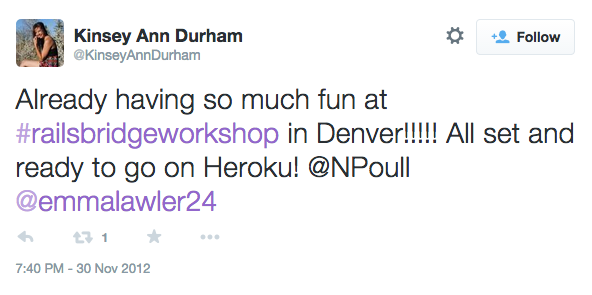by Jen Lindner
Santiago Pastorino (@spastorino) is a core contributor to Ruby on Rails. (Read in spanish)
Can you tell us a little about your background, and how well you knew Rails when you first participated in a BugMash?
My name is Santiago Pastorino and I am from Montevideo, Uruguay. I received my degree in Computer Engineering in Uruguay. It’s a 5 year program that’s very similar to a BS in Computer Science in the US.
I worked with Java with a local company for two years while I finished up my degree. After completing the degree my partner José and I decided to start WyeWorks. It was at this time that we started to get much more interested in dynamic languages and their frameworks, like Ruby on Rails and Python/Django.
We considered which language and framework to use for our first consulting job and since we preferred Ruby and José had previously worked with Ruby, we decided it would be best to start with Ruby on Rails.
We never regretted the decision. 🙂
This was midway through 2008, and it was at the start of 2010 that I participated in the BugMash. I had little experience and in that year and a half I didn’t program very much because we had to take care of the business as well.
So my experience was very limited.
What drew you to it? Had you ever built or worked on a framework before?
I never built or contributed to any frameworks before contributing to Ruby on Rails. But with Ruby on Rails we had various reasons to do so. Since it was the framework we worked with every day, it had to shine. Our business is to sell high quality consulting and development by the hour. Contributing is the best way to position ourselves as experts with the tool.
Do you remember any of the bugs you fixed that day? How challenging did they seem to you as a newcomer?
At the time, Ruby 1.9 was on the rise. Ruby 1.9.1 had already been released and Rails was starting to support it. There were a few failing tests with Ruby 1.9 and I believe I fixed three, some partly shared with others who were also participating. It was very challenging at the time because I didn’t have the necessary understanding to do many things.
Where did you find help?
Many people from BugMash helped me during the event, among others, the organizers like Sam Elliott. After the BugMash, the other members of the core team, most importantly Yehuda Katz, José Valim, and Jeremy Kemper helped me very much to contribute.
What did you find most satisfying about the experience? And why did you continue working on tickets afterwards?
I especially always liked to understand in depth how things work. To contribute to a tool you have to understand how it works. It seems to me the best way: research and naturally you later find ways to make improvements.
I kept building on what I said earlier: at WyeWorks we are committed to development on the framework. It’s part of our business, it’s a way to support the work that so many people have done, and it’s truly our passion.
Do you think you’ve learned more about the philosophy behind Rails by running its tests and fixing issues than you have by just using it?
More than running and fixing tests, generally both using the framework as much as contributing to it add up to knowledge and add up to better understanding the philosophy behind Rails. The perspectives that you get as user and as collaborator with the framework are different.
Is there any advice you’d like to give to people who might want to participate an in open source project?
My recommendation is simple. One has to dedicate time to try to understand why things work. Everyone who has contributed has dedicated a lot of time. No one is born with the knowledge.
Besides, by luck, the people who contribute to Rails are very friendly, something that lamentably doesn’t happen on other projects. This is very good because as you start to contribute there are many people willing to talk to you and help.


You must be logged in to post a comment.